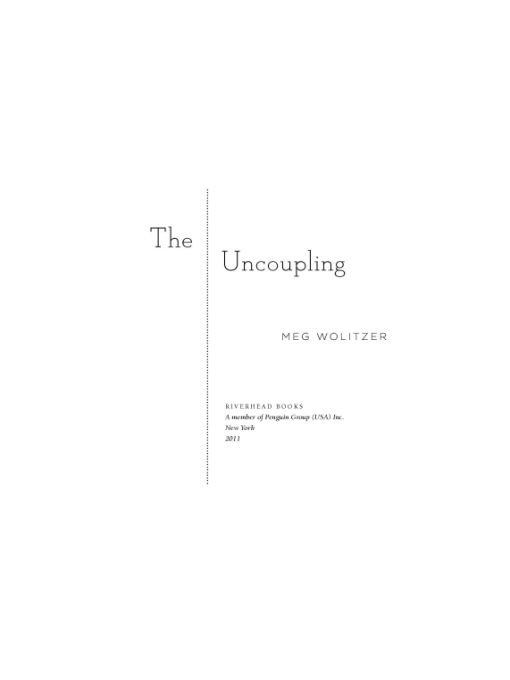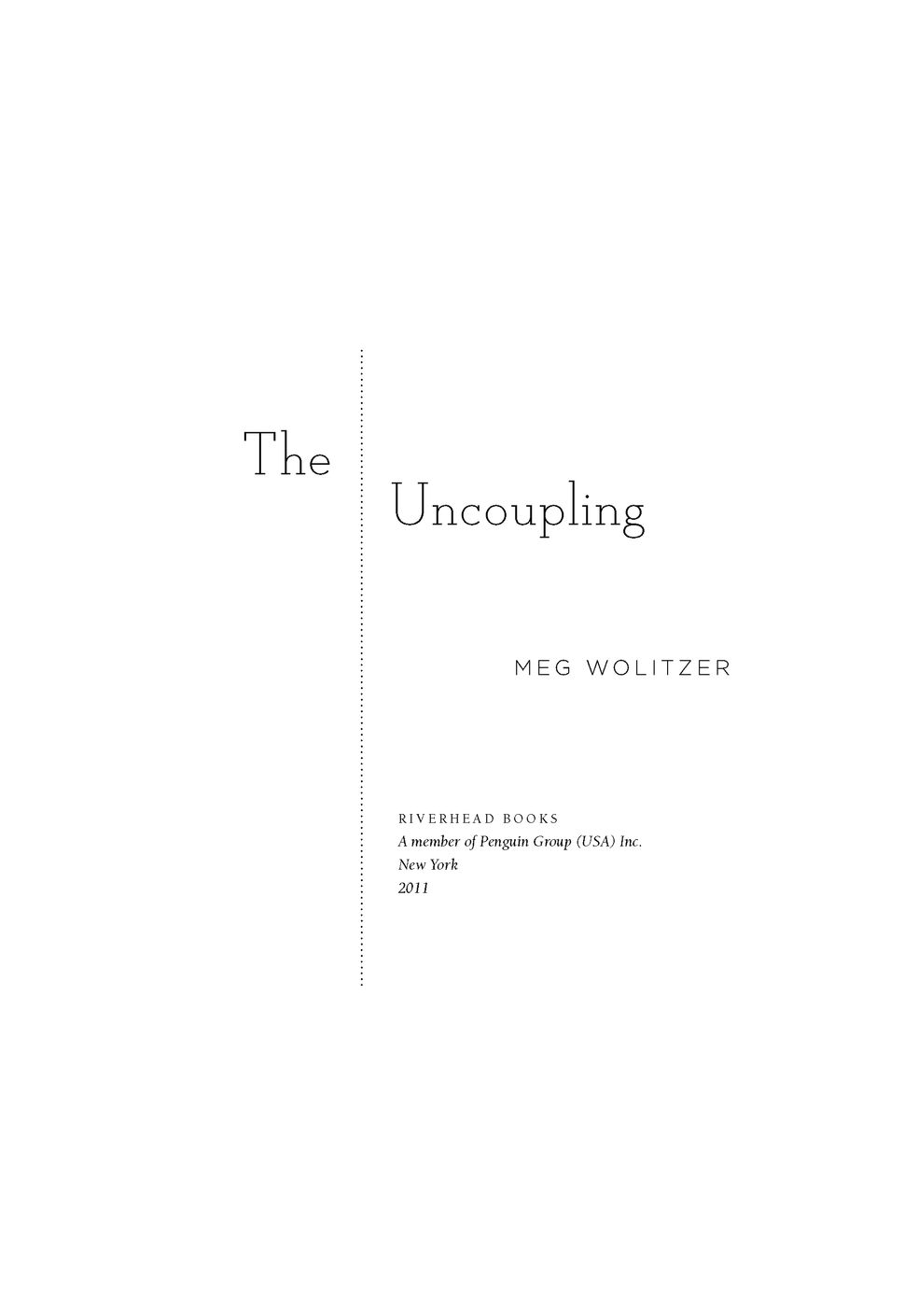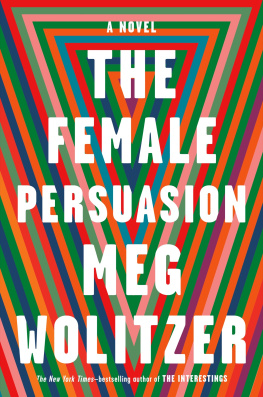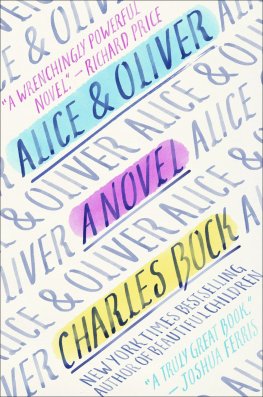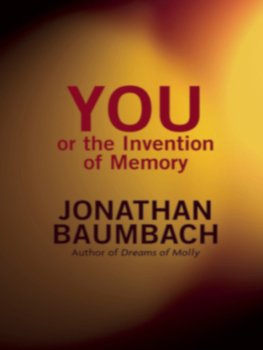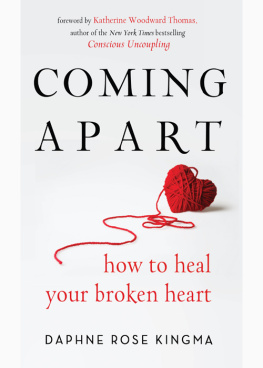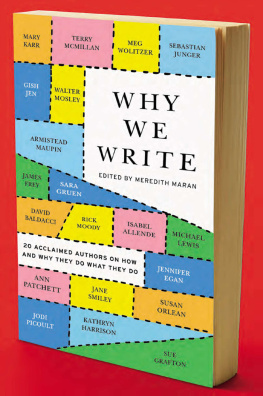Table of Contents
ALSO BY MEG WOLITZER
The Ten-Year Nap
The Position
The Wife
Surrender, Dorothy
This Is Your Life
Hidden Pictures
Sleepwalking
For Sarah McGrath
I tell a tale of an unusual enchantment that made women turn away from their men. O Eros! This spell entranced the young ones, glued to their mirrors; the ones in the middle of life, glued to their duties; and the old ones, glued to air. Why did these gentle women withdraw so swiftly, without mercy? Do not cast judgment upon themthey knew not what they were doing, or what had been done to them. Their refusals were made in blindness, in innocence, and in bed after bed after bed.
Part
One
.
People like to warn you that by the time you reach the middle of your life, passion will begin to feel like a meal eaten long ago, which you remember with great tenderness. The bright points of silver. The butter in its oblong dish. The corpse of a chocolate cake. The leaning back in a chair at the end, slugged on the head and overcome. Dory Lang had always thought there was a little cruelty in such a warning. It was similar to how, when she had a baby, people always tried to clue her in on what they were sure would befall her. Once, long ago, Dory and her infant daughter were riding a bus in the city, when an old woman leaned over and said, May I tell you something, dear? She had a kind face full of valleys and faults. Dory imagined she was about to describe the babys beautyin particular, the curve of the mouthand she made her own mouth assume a knowing, pleased modesty. But what the woman said, leaning even closer, was, You will never have another day in your life that is free of anxiety.
There was a little private pleasure to be taken in the fact that that old woman, though she was of course correct, was now dead, and Dory was not. As for the warnings about the disappearance of passion, Dory recognized the sadism stitched into the words. Because the love lives of the women who said such things had gone soft and pulpy and tragic, they took a little comfort in telling as many women as they could that someday such a change would happen to them too.
Dory and Robby felt they were exempt from such an outcome, assuming that even when they were so old that they appeared interchangeableeven when his ankles were as narrow and hairless as hers, and her lips were as thin and collagenless as his, and their pubic hair could have belonged to Santa Claus; even when they resembled those dried-apple dolls sold in the gift shops of folk museumsthey would sleep together frequently, happily, and not just gently, but with the same gruff, fierce purpose as always. Around them, in other houses in their neighborhood, there would be a terrible pile-up of nonsex-having couples, all bone and tendon and indifference and regret.
Warmly, hotly, tirelessly, in their own bed they would stay.
The Langs had been teaching English at Eleanor Roosevelt High School in Stellar Plains, New Jersey, for a decade and a half when everything changed. It had been an uneventful school year so far; there had been no deaths, neither student nor teacher, and not even any halfhearted, prankish bomb threats, which had become as common to suburban high schools as intramural sports.
Robby and Dory Lang began that year at Eleanor RooseveltElro, everyone called itwith the same optimism that they almost always felt. It had grown tempered in recent years, since the economy had tumbled, and certain concrete signs of optimism were no longer as central a part of the school experience: the smell of pencils, for instance, with their suggestion of woodshop and campgrounds and the promise of some precocious kids standout in-class essay. Pencils still lurked, fragrantly, but you had to look for them, and they seemed outnumbered by all things with a keyboard. Still, though, the Langs were hopeful; still, they thought it would be a good year.
Together they were often spoken of in one breath by the other faculty members as Robby and Dory Lang, or just Robby and Dory, or by the students as Mr. and Ms. L, those two married, easygoing, still fairly young English teachers who walked the halls with a genial air. There were some teachers at Elro who lived to crack down on the kids. Wheres your pass? they would demand of a boy with a mouth freshly wet and slack from the water fountain. Wha, wha? said the boy, stammering, dripping. But the kids knew that Dory and Robby werent out to get them. Even their pop quizzes were humane.
At just past forty they were both good-natured, decent-looking, tallish, and as dark-redheaded as Irish setters. Robby wore egghead eyeglasses that had become fashionable in recent years. He had a hard shield of a chest, and he rode a bike on weekends through the smooth streets of the neighborhood. Each morning he unscrewed one of the green glass canisters on the countertop and poured himself a dusty bleat of oat and twig, pious about his intake, wanting to live a long time so he didnt miss a second with his wife or daughter.
The Langs were young, but not too young; old, but not too old. Girls often exclaimed over Dorys boots, which dated back to her Brooklyn days and were the approximate color of caramel, narrowing to a subtle pointnot quite the boots of a snarling female rocker, but not the boots of a hiker with bags of muesli swelling her pockets either. The girls also liked Robbys pale, much-laundered work shirts, which by third period he had invariably rolled up at the sleeves, revealing arms with a light spatter of goldenrod hair. Neither Robby nor Dory repelled or depressed the kids the way their parents tended to. Nor were they like the kids themselves, who had unfinished faces and piercings that punctured the most tender membranes of their bodies like buckshotthe kids with their energy drinks, their Xtreme sports injuries, and with their restless need to be in touch through some device, even if in real life theyd only been apart long enough to go to the bathroom:
what r u up 2
peeing
when will u be back
look up i am back
In the time that theyd spent in the English department at Eleanor Roosevelt, Robby and Dory had both been named Teacher of the Year with surprising frequency. Once in a while an art teacher with a head sprouting dreadlocks, or the unusually lenient Spanish teacher, Seor Mandelbaum, busted up the monopoly, but for years at a time husband and wife had predictably passed the honor from hand to hand.
It was as if they had each said to the other:
Okay, this year you be the better teacher. This year you be the one who remains in the classroom tacking up pictures of J. D. Salinger and Maya Angelou, with captions like, For Chrissakes, Jerry, You Were Never a Phony, or, So Why Does It Sing, Maya?
Meanwhile, Ill be the one who ducks out the moment school is over, telling the class over my shoulder, Dont forget to check eSignment for tonights homework. And for those of you who cant stand to wait, Im asking you to read until the part where he sees Daisy Buchanan again.
Wait, until who sees who? someone would ask, but it was too late; their teacher was out of there, done, gone.
Robby and Dory gracefully and uncomplainingly took on those roles, and then, the following year, they switched. They had met at a hotel in Minneapolis during an education conference in the earliest, most know-nothing days of their teaching lives. Teachers flowed through the revolving doors, laughing, gesturing, using the words curriculum and curricular. Robby Baskin, twenty-four years old then, an age when even not really being beautiful falls under the category of beautiful, was in the bar off the polished hotel lobby, sitting on a high stool with his long, weedy legs hanging down. He was talking with two female teachers, all their voices loose and careless, and Dory Millinger of Brooklyn, aged twenty-three, waded closer.

